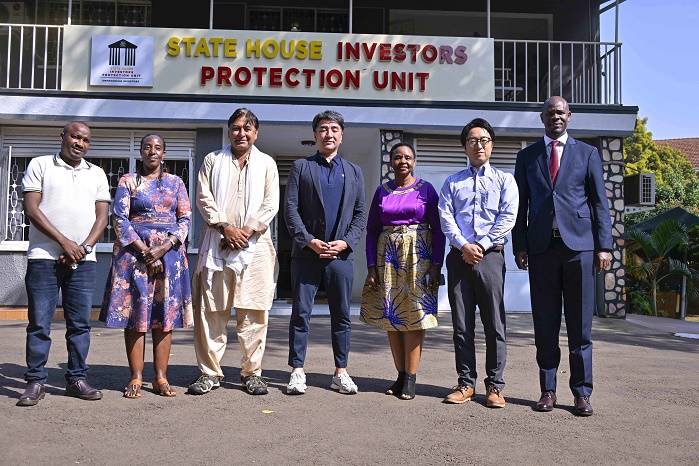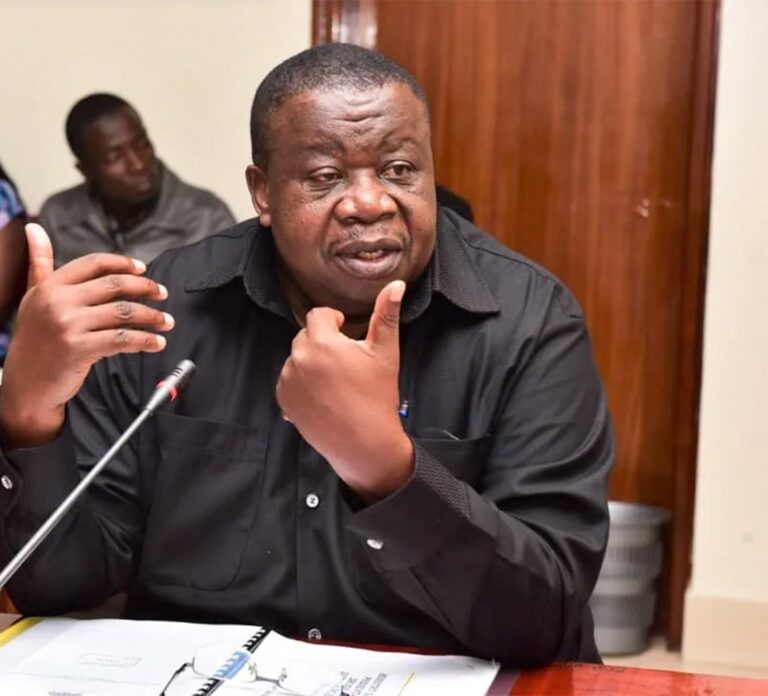
State House Investors Protection Unit (SHIPU) head Col. Edith Nakalema (third right) in a group photo with Yoshino Trading Ltd CEO Shamsake Nakamishi (fourth right), Yoshino Trading Ltd Director Kotaro Kake (second right), Yoshino Trading Ltd MD Ali Abas (third left), the National Forest Authority Executive Director Stuart Maniraguha, the National Forest Authority (NFA) Executive Director Stuart Maniraguha (right) and NFA personal Assistant Hope Kyampaire (second left) after a meeting at SHIPU officers in Kampala on the 30th July 2025. Photos by PPU/Tony Rujuta.
Investors pose for pictures after the high level meeting
HABARI DAILY I Kampala, Uganda I In a show of Uganda’s growing appeal as a top destination for international investors, Japanese automobile dealer Yoshino Motors is explores opportunities for further expansion in the East African country.
Yoshino specialises in importing, re-exporting, and trading high quality Japanese cars.
Yoshino Motors’ Chief Executive Officer, Shunsuke Nakanishi, and the company’s Uganda Managing Director, Mr. Abas Ali, met Col. Edith Nakalema, the Head of the State House Investors Protection Unit (SHIPU), on Wednesday, July 30, 2025, to table their proposition.
The high-level discussions with were held at the State House Investors Protection Unit Offices in Kampala. Their visit comes as Yoshino celebrates 13 years of operation in Uganda, where it has already created jobs for over 50 Ugandans and contributed to the development of the local automotive sector.
Col. Nakalema emphasized the government’s commitment to protecting legitimate investors through modern and efficient channels.
She briefed the Japanese investors on the government’s investment facilitation framework and assured them that all critical ministries, departments, and agencies (MDAs) are accessible through the online portal. She said this innovation has already proven effective, with investors from countries like India and China successfully using it to resolve complaints and access services without interference.
She lauded the long-term investment culture of Japanese companies, referencing Yoshino Motors’ rich heritage that dates back to 1959, when it was founded by Nakanishi’s grandfather.
“In Japan and India, the investments that were started by your grandfathers continue growing in their names through their children and grandchildren. It’s a great lesson to us that we must ensure our children continue adding value through what we’re doing today,” she remarked.
In his remarks, Nakanishi expressed gratitude for the warm reception and reiterated the company’s belief in Uganda’s economic potential.
“Our company was established in 1959 by my grandfather. Thirteen years ago, we chose to invest in Uganda. From our view, Africa, and Uganda in particular, is a growing market with many features that make it attractive. We don’t hesitate to put more investment here,” he said.
Nakanishi praised the effectiveness of Uganda’s digital investment support systems and expressed interest in exploring new ventures in vehicle production, parts manufacturing, and local partnerships.
The meeting also drew participation from the Acting Executive Director of the National Forestry Authority (NFA), Stuart Maniraguha, who offered Yoshino a new avenue of collaboration.
Maniraguha suggested that Uganda could supply wood materials for Yoshino’s automobile interiors, a move that could open up downstream manufacturing possibilities within the country.
“For some of your vehicles, we know wood is used for interiors. Uganda has the potential to provide that wood. You don’t even need to carry it abroad; you can manufacture the vehicles from here,” he said.
He also appealed to Yoshino Motors to continue its transition toward hybrid and energy-efficient vehicles.
“Climate change is a serious global issue. Reducing emissions is critical. We’re encouraged that you are working on hybrids, and we urge you to stay on that path,” he emphasized, further pledging full support from the forestry sector, and encouraged the company to explore other industrial linkages for sustainable growth.




